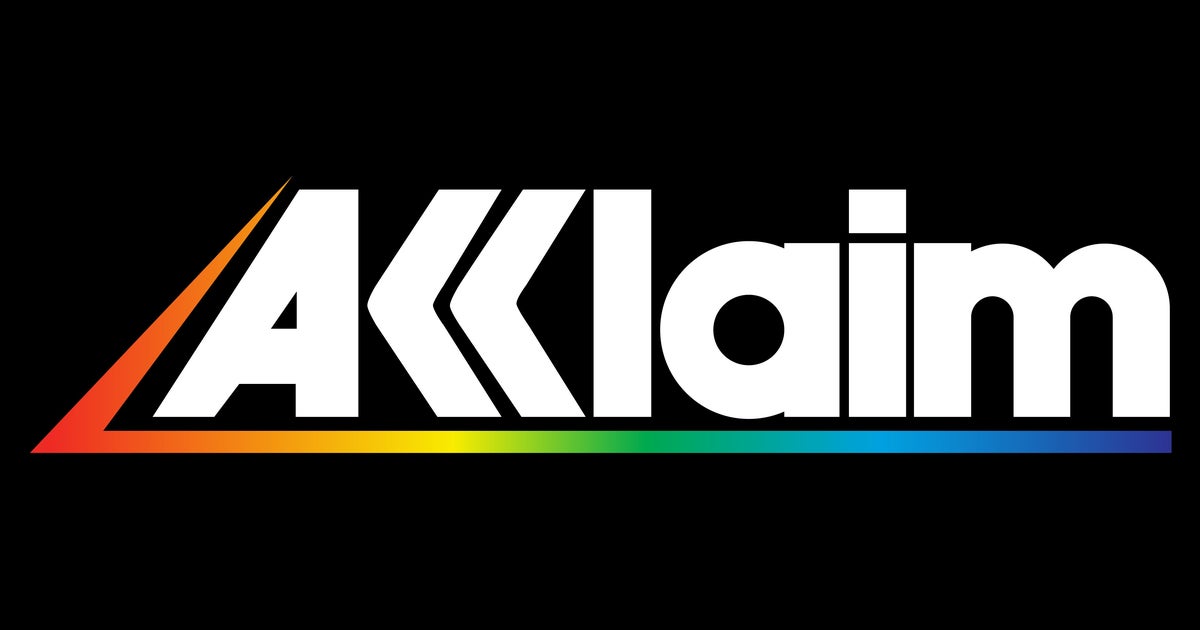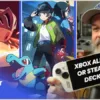What’s going on with Acclaim?
Alex Josef, CEO of the newly resurrected Acclaim, has fond memories of the publisher from his youth. “I definitely was a fan of Acclaim,” he says. “I think they did some great things – and they did some not so great things.”
The New York-based publisher was a big player on the consoles of the nineties, releasing hits like Turok: Dinosaur Hunter, Mortal Kombat, and Dave Mirra Freestyle BMX. But the company crashed into bankruptcy in 2004, and tales from the time – like how the planned sequel Dave Mirra Freestyle BMX 3 ended up becoming the lurid commercial disaster BMX XXX – give an impression of chaos behind the scenes. Josef doesn’t want to dwell on the old Acclaim’s ignominious end, however. “That’s not really for me to comment on or worry about,” he says.
The new Acclaim, by contrast, is a tale of entrepreneurial opportunity. Josef has been working in the games industry since the late 1990s, initially in PR, but along the way he has spun up side hustles involving everything from real estate to a cheese and wine bar. “My brain goes a million miles an hour, and I am a serial entrepreneur,” he says. “I work 18 hours a day.”
The cheese and wine bar, for example, was “just a little passion project” alongside Josef’s main work in video game consulting and marketing. He founded VIM Global Consulting in 2009, and was CEO of the indie publisher Graffiti Games from 2018 to 2022.
The Acclaim deal came about after Josef was approached by a handful of industry veterans. “We’ve been in the games industry for a long time, at least a couple decades each, and we were like, ‘What if we took our combined expertise with publishing, licensing, development, and marketing, and looked at applying that and revitalizing a really iconic, cool brand?’ And there were two or three that we were thinking about, that we were looking at, and we just kept coming back to Acclaim.”
Josef won’t be drawn on what the other potential brands were, but he affirms that Acclaim made the most sense as a resurrection candidate because of its brand associations. “We just like the whole vibe and the energy and the edginess of the Acclaim of old,” he says, adding that the plan is to pay homage to the publisher’s heritage while making a new shift that will be “appealing to today’s gamer.”
Acclaim was certainly edgy back in the day. The publisher gained a reputation for its wild marketing stunts, which included offering to pay people’s speeding tickets during the release of Burnout 2, and saying it would pay grieving families to put an advert for ShadowMan 2 on their deceased relative’s gravestone. This is one aspect of Acclaim that Josef isn’t planning to bring back, however.
“I don’t think that we’re going to be as focused on stuntiness,” he says. “I’m a big fan of creative marketing. I mean, the way that things originated for me in the games industry was through PR and marketing, so I love anything that’s creative, maybe stunty, but not stunty where it’s in poor taste or anyone’s going to get potentially hurt or break the law. I think that there’s a way to do things that’s creative, but that isn’t too out of bounds. So I think creative marketing campaigns will be a big part of what we do.”
Scattered IP
Josef says that people have expressed a “lot of curiosity” since the relaunch of Acclaim was announced back in March, and particularly about whether we will see a return of Acclaim’s old IP, which includes titles like Fur Fighters, Re-Volt, and Extreme-G 3. But for many of Acclaim’s biggest releases – like Mortal Kombat, Turok, NBA Jam, WWF Wrestlemania, and the many games based on The Simpsons – the publisher was often only licensing the IP in the first place. Then, when Acclaim was dissolved, the rights to its wholly owned games were sold off to various different groups. Josef et al. might own the Acclaim name, but the rights to the gaming franchises are long gone.
“All of the IP just scattered in the wind,” laments Josef. “Some of that IP, there’s just no access to it, no ability to get that back.” However, he acknowledges that it might be possible to buy or license some of the other IPs associated with Acclaim. “It’s not off the table,” he says. “We are talking with a lot of the stakeholders for some of the old IP. A lot of it is just kind of crazy – it doesn’t make sense in terms of, ‘I don’t know if we want to look at paying that much just for this’.”
He adds that if they were able to acquire some of the old IP, the idea would be to match it up with developers who are “really in line and in sync with what that IP was.” But resurrecting old IP is “really not the objective” of the revived Acclaim, he emphasises.
“I think the objective first and foremost is a heavy focus on indie creators and demonstrating that we’re going to get behind games, regardless of budgets. Don’t be afraid to come and approach us if you have a game and you think the budget’s too small for Acclaim.” Josef says the publisher’s strategy is to build a strong foundation and “not put all of our eggs in one basket,” before aiming to grow and take on riskier projects.
“I don’t think this is an environment where you want to be taking unnecessary risks. I’d like to have a job in a year, that’s what I keep saying.”
Acclaim’s strategy doesn’t necessarily mean it’s limited to just small investments or seasoned developers, Josef clarifies, noting that several projects on its books are from developers making their first commercial game. “It just means not overly speculative.”
He adds that they’re searching for committed, collaborative partners, where Acclaim can add value to their game. “That’s really important, because we’re trying to build relationships with developers, ideally, and not have everything be just transactional.”
Like many publishers in the current climate, Acclaim is looking to sign games that are already a fair way into development. “That’s a smart way to go, because you can’t predict what’s going to happen in two or three years, and anything that’s in that sort of concept phase is way too high risk,” says Josef.
“With the start of a company, you have to be very, very calculated and very judicious in the decisions that you make about publishing, and which games to publish, and who to partner with. And late-stage games – games that are closer to launch and that have a clear path to launch – are obviously much more desirable and make much more sense, because there’s a lot less left to chance.”
Indie focus
Acclaim recently put out a sizzle reel showcasing some of the games it’s publishing, including the chaotic package delivery title Tossdown from Fer Factor and the hand-painted action rogue-like Talaka from Potato Kid. But Josef adds that there are a couple of projects in development where they have matched developers with licensed IP – although not Acclaim’s old IP.
Josef emphasises again that relicensing those old Acclaim properties might not necessarily be the best move for the newly reborn publisher.
“The biggest component there is doing something that makes sense – and that means makes sense in terms of timeline, IP, and investment. Just because it’s Acclaim IP of the past doesn’t mean that everybody wants to play it, doesn’t mean that it’s going to make a great game, and doesn’t mean that it’s worth the price tag – and all of those have to align in order for it to make sense, otherwise what’s the point?”
He adds that while some of Acclaim’s old IP is “certainly relevant and will resonate,” some of it was also “not great, truth be told.”
Given that, it’s worth asking the question: why buy the Acclaim brand at all?
“I love the brand in and of itself,” replies Josef. “There were thoughts and talks about, like, ‘Well, maybe we just spin up something totally brand new’. But having the power of a brand, having people that are really well-versed and entrenched in this industry… You know, we’re not coming at this from some other industry and [going], ‘Hey, let’s do Acclaim, that was an old iconic video game brand’. I think coming at it with a clear game plan, a clear strategy, and then with the intention to really grow and develop the brand in an intelligent manner with great games is a really good way to go.
“And the brand is fantastic. It looks good. It sounds good. It places well. I love just a single-word brand. This had everything, and it just made a lot of sense. I mean, we spent a lot of time going back and forth and thinking about it. This wasn’t just some easy, light decision – ‘Let’s just get an old brand’. There was a lot of thought that went into it.”
Atari under Wade Rosen has had some recent success in reviving old brands and trading on retro game nostalgia – but with its current line-up of games, Acclaim seems to be placing little to no emphasis on the retro angle. Josef counters that the newly relaunched publisher’s tagline is “past meets future,” and that it’s about “paying homage” to what’s gone before while building games with elements that will appeal to fans now and in the future.
Yet it remains difficult to draw a line between the Acclaim of the past and the Acclaim of today. When the Microprose brand was revived a few years ago, there was an obvious continuum whereby the new version of the publisher was focused on the same kinds of simulation titles that the original company championed in the 1980s and 1990s. The revived Acclaim, meanwhile, is targeting PC-focused indie games that bear little resemblance to the big-hitting console action titles that made the brand famous.
Josef isn’t worried about the juxtaposition, however. “I think really there should be more of a focus, in our opinion, on some of the great indie creators, whether they be small or mid-size,” he says. “We want to have a heavy focus on indie. And at the end of the day, I think that’s where you’re able to help the most people or help the industry the most in terms of bringing more games to the forefront and helping them get visibility.
“There’s some of our games where I don’t know where they would’ve gone – if we hadn’t discovered them, I don’t know if anybody else would’ve discovered them. And some of our games, lots of people were looking at them, and we got really lucky and also did a really good job of just communicating with the developer why they should work with us, and they felt the same way. And these weren’t new developers: they had experience, they’d been doing games for a while. So whatever it is, I feel we’re doing the right thing in terms of being able to communicate what our mission is to developers to make them want to work with us.”








Add comment